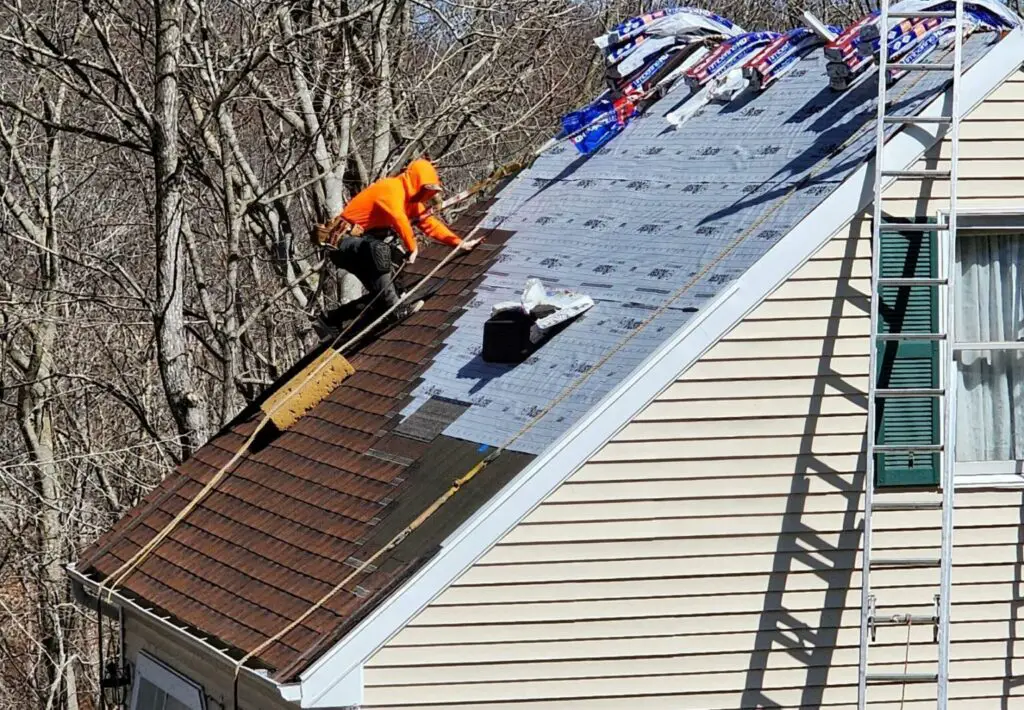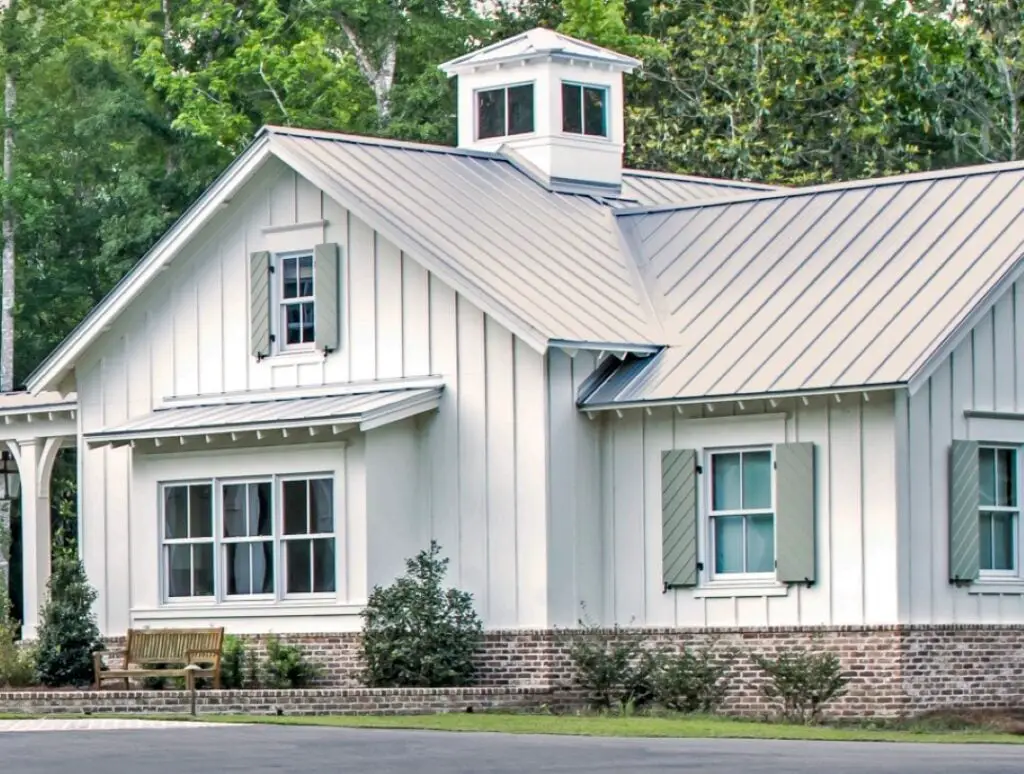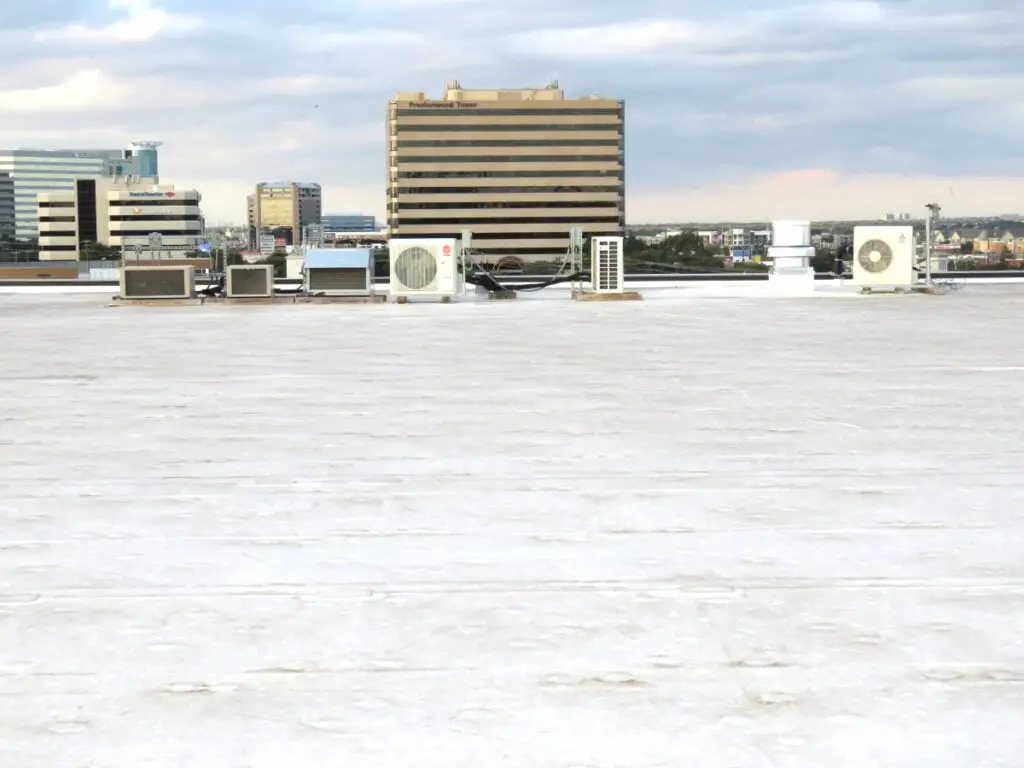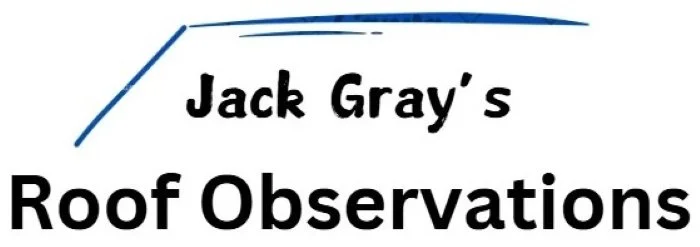Also see: Roof Cost Calculator
Table of Contents

Introduction
In this article, I’ll give you the typical costs for replacing a roof in the U.S. in 2026, for both residential and commercial buildings. I’ve spent years approving contractor bids and researching roofing costs around the country for my clients, and the roof cost estimates I provide here were produced by analyzing current material prices, regional labor rates, and other relevant factors, including roofing project values from actual building permit data from a good set of sample locations. The roof systems covered here include asphalt shingles, metal roofing, slate, tile, synthetic composite, cedar shakes, and all of the common types of low-slope commercial roofing.
Actual roof costs will vary depending on location, roof size, roof slope, complexity, and, of course, the type of roof system installed. Asphalt shingles are by far the most popular residential roof covering in the U.S., but various types of metal roofing, concrete and clay tile, and a few others are also relatively common. Commercial “flat” (low-slope) roofs typically use single-ply membranes (EPDM, TPO, PVC), modified bitumen, or spray-applied polyurethane foam systems.
On average, residential roof replacement prices in 2026 typically range from around $6 per square foot for basic asphalt shingles to around $35 per square foot for high-end copper or slate roofing. This means a typical 1,700-square-foot pitched roof may cost anywhere between $10,200 and $59,500, depending mostly on which roofing material you’re using.
Besides the installation cost, homeowners and property managers should consider a roof’s lifespan, expected performance, maintenance needs, and potential to reduce energy costs. A cheap roof may need to be replaced in just 20 years, while an initially more expensive roof could last 50 years or longer, making its total lifecycle cost actually lower than the cheap roof. Nicer long-lasting roofs also tend to add far more value to the property when you’re selling it.
Commercial low-slope roofing typically costs more than people might think, due to insulation requirements. Board insulation is normally installed as a part of the roof system, and costs around $1 to $1.50 per square foot (installed) per inch of thickness while providing an R-value of around R-4 to R-6 per inch.
Commercial roof replacement prices in 2026 range, on average, from about $5 per square foot for a ballasted EPDM overlay system with no insulation included to about $17 per square foot for a 2-ply modified bitumen system with enough insulation to meet an R-30 energy code requirement for roofs with above-deck insulation.
The tables below provide cost information for all roof types and systems.
Roof Cost by Location
For a more detailed look at roofing cost by location, see my state roof cost guides linked at the end of this article.
Where you live can have a huge effect on the cost of a roof replacement. Labor rates, building codes, permitting fees, and even the local climate all influence the price. The cost estimates I show here are national averages, intended to give you good general idea of what to expect. Actual prices can vary by up to 50% (for places like New York City or San Francisco) simply due to where your roof is.
- Urban vs. Rural: Roof replacements in large metropolitan areas tend to cost more than in smaller towns due to higher labor costs, restricted roof access, higher business overhead, and stricter permitting requirements.
- Regional Labor Rates: Labor costs tend to be higher in parts of the Northeast and West Coast, while regions in the South and Midwest often see lower rates.
- Climate Considerations: Areas with heavy snow, frequent storms, or high winds may require stronger, thicker materials or additional installation steps, raising costs. For example, hurricane-prone regions will require enhanced fastening systems, while thicker (and more expensive) materials are recommended for roofs in Hail Alley.
- Material Availability: Materials produced locally (such as concrete tile in the South or natural slate in the Northeast) can be relatively less expensive than the same materials if they have to be shipped long distances.
Roof Cost by Material

Residential Roofing Materials
Asphalt shingles account for about 75% of residential roof installations and more than half of roofing material sales. They are affordable, easy to install, and widely available. The three main categories are 3-tab shingles, architectural (or dimensional) shingles, and luxury shingles. Installation costs typically range from about $5 per square foot for basic 3-tab shingles to $7.70 or more per square foot for premium luxury shingles. For a typical 1,700-square-foot roof, the total replacement cost is usually between $8,500 and $13,500, depending on the shingle product line. Lifespan typically runs 20 to 40 years. Learn more about asphalt shingle roof costs.
Other materials that make up the remaining share of the market (and generally cost more):
Metal Roofing – Steadily growing in popularity, metal roofing currently accounts for about 18% of the residential roofing market. Costs start around $8 per square foot and can reach $35 or more, depending on the system type and type of metal. A typical installation might cost $14,000 to $40,000. Metal roofs usually last 40 to 80 years. Learn more about metal roofing costs.
Clay and Concrete Tile – Common in warmer climates. These heavy, long-lasting materials cost about $10 to $20 per square foot, with an average roof installation costing $15,000 to $35,000. Tile roofs typically last 50 to 70 years or more. Learn more about tile roofing costs.
Slate Roofing – A premium natural material known for its great appearance and long lifespan. Costs usually fall between $20 and $35 per square foot, or $30,000 to $60,000 for an average-sized roof. Properly installed, slate can last 75 to 100 years or longer. Learn more about natural slate roof costs.
Synthetic Composite Roofing – Engineered polymer shingles/tiles designed to look like slate, wood, or clay tile. Prices average $8 to $15 per square foot, with installation costs of around $14,000 to $20,000 for the average roof. Synthetic composite roofs typically last 40 to 60 years.
Commercial Roofing Materials
Single-Ply Membranes – EPDM, PVC, and TPO are the three most common types of single-ply membranes used on commercial low-slope roofs. These systems are lightweight, flexible, and relatively quick to install. Costs typically range from about $5 to $17 per square foot, depending on the membrane type, membrane thickness, attachment method, and whether new insulation is included. For a 25,000-square-foot commercial roof, the total replacement cost is usually between $125,000 and $375,000. Lifespans typically run 20 to 35 years. Learn more about single-ply membrane roof costs.
Modified Bitumen – A time-tested asphalt-based system, modified bitumen is installed as a 2-ply or 3-ply layered system. Costs range from about $8 to $18 per square foot, or $200,000 to $450,000 for a 25,000-square-foot roof. Modified bitumen systems typically last 20 to 30 years. Learn more about modified bitumen roof costs.
Standing Seam Metal – While more common on steep-slope commercial buildings, standing seam panels are also used on low-slope roofs with adequate pitch. Costs start around $10 per square foot and can exceed $20 per square foot, with a 25,000-square-foot installation costing between $250,000 and $500,000. Lifespan is usually 40 to 60 years. Learn more about standing seam metal roof costs.

Things to Keep in Mind
These roof cost estimates should be fairly accurate; I make an effort to update them regularly using current material prices and labor data. Keep in mind that the costs listed below are averages, and actual costs can vary significantly depending on your specific location and the size, configuration, accessibility, and condition of your particular roof.
The residential roof cost estimates provided here are for roof replacements on roofs with a 6/12 pitch and include all standard roof components (underlayment, ice & water shield, fasteners, flashing, etc.). Steeper roofs or roofs with complex designs can increase costs by as much as 30%.
Removal of an existing commercial or residential roof typically adds between $1 and $3 per square foot. For the estimates in the tables below, $1.50 per square foot for tear-off and disposal has been included in all pricing.
Table 1: Residential Roof Costs
| Average Cost of a Residential Pitched Roof | |||
|---|---|---|---|
| Roof Type | Average Installed Cost Per Square Foot |
Average Installed Cost Per Square (100 sq. ft.) |
Average Installed Cost Typical Residential Roof (1,700 sq. ft.) |
| Asphalt Shingles 3-Tab or Strip Shingles |
$5.60 | $560 | $9,520 |
| Asphalt Shingles Architectural or Dimensional Shingles |
$6.15 | $615 | $10,455 |
| Asphalt Shingles Luxury or Premium Shingles |
$7.65 | $765 | $13,005 |
| Cedar Shake & Shingle Red Cedar Shingles |
$13.95 | $1,395 | $23,715 |
| Cedar Shake & Shingle Red Cedar Shingles Class A Fire Rated System |
$15.65 | $1,565 | $26,605 |
| Cedar Shake & Shingle Red Cedar Shakes |
$13.45 | $1,345 | $22,865 |
| Cedar Shake & Shingle Red Cedar Shakes Class A Fire Rated System |
$15.15 | $1,515 | $25,755 |
| Metal Roofing Exposed Fastener Panels (Aluminum, Basic Coating) |
$11.00 | $1,100 | $18,700 |
| Metal Roofing Exposed Fastener Panels (Steel, Basic Coating) |
$8.25 | $825 | $14,025 |
| Metal Roofing Exposed Fastener Panels (Steel, PVDF/Kynar Coated) |
$10.30 | $1,030 | $17,530 |
| Metal Roofing Metal Shingles (Aluminum, Basic Coating) |
$14.00 | $1,400 | $23,800 |
| Metal Roofing Metal Shingles (Steel, Basic Coating) |
$10.50 | $1,050 | $17,850 |
| Metal Roofing Metal Shingles (Steel, PVDF/Kynar Coated) |
$13.10 | $1,310 | $22,275 |
| Metal Roofing Standing Seam Metal (Aluminum, Basic Coating) |
$17.00 | $1,700 | $28,900 |
| Metal Roofing Standing Seam Metal (Steel, Basic Coating) |
$12.75 | $1,275 | $21,675 |
| Metal Roofing Standing Seam Metal (Steel, PVDF/Kynar Coated) |
$15.90 | $1,590 | $27,090 |
| Metal Roofing Standing Seam Metal (Copper) |
$34.00 | $3,400 | $57,800 |
| Metal Roofing Standing Seam Metal (Zinc) |
$23.00 | $2,300 | $39,100 |
| Metal Roofing Flat Seam Metal (Copper, Soldered Seams) |
$40.00 | $4,000 | $68,000 |
| Slate Roofing Hard Natural Slate (Grade S1) “Standard” 1/4″ Thick |
$24.05 | $2,405 | $40,885 |
| Slate Roofing Hard Natural Slate (Grade S1) “Rough Texture” 1/4″ to 3/8″ Thick |
$26.75 | $2,675 | $45,475 |
| Slate Roofing Hard Natural Slate (Grade S1) “Architectural” 3/8″ to 1/2″ Thick |
$31.25 | $3,125 | $53,125 |
| Synthetic Composite Synthetic Composite Shingles (Engineered Polymeric Tile) |
$12.60 | $1,260 | $21,420 |
| Tile Roofing Clay Tile Flat Profile (Shingle Style) |
$15.40 | $1,540 | $26,180 |
| Tile Roofing Clay Tile Mission (2 Piece) |
$16.30 | $1,630 | $27,710 |
| Tile Roofing Clay Tile S-Profile (1 Piece) |
$14.70 | $1,470 | $24,990 |
| Tile Roofing Clay Tile Premium Styles |
$18.50 | $1,850 | $31,450 |
| Tile Roofing Concrete Tile Flat Profile (Shingle Style) |
$11.70 | $1,170 | $19,890 |
| Tile Roofing Concrete Tile S-Profile (1 Piece) |
$11.20 | $1,120 | $19,040 |
| Tile Roofing Concrete Tile Premium Styles |
$14.00 | $1,400 | $23,800 |
| Tile Roofing Lightweight Concrete Flat Tile (Shingle Style) |
$12.20 | $1,220 | $20,740 |
Table 2: Commercial Roof Costs
Energy codes play an important role in commercial roof costs. When a roof system includes above-deck insulation, like most commercial low-slope roofs do, local codes will set a minimum required R-value for the system. Most U.S. climate zones require a minimum R-25 or R-30 thermal value. Above-deck roof insulation typically costs between $0.75 and $1.50 per inch per square foot. Polyisocyanurate insulation, the most common type, provides between R-5 and R-5.7 per inch, so you can see how that cost can add up.
When performing a roof recover (installing a new roof over an existing one), these insulation requirements typically do not apply. Recover projects usually involve installing a cover board over the existing roof system to provide a suitable substrate, followed by the new membrane. The insulation in the old roof stays in place, and updated and/or increased energy code R-value requirements can be ignored until the next roof replacement. Keep in mind that roof recovery is not always permitted or advisable, depending on the local code, the condition of the existing roof, and manufacturer requirements.
Where the price estimates below include R-30 insulation, deduct $1.25 for roofs that require R-25, add $1.25 for roofs that require R-35, and so on.
| Average Cost of a Commercial Low-Slope Roof | |||
|---|---|---|---|
| Roof Type | Average Installed Cost Per Square Foot |
Average Installed Cost Per Square (100 sq. ft.) |
Average Installed Cost Typical Commercial Roof (25,000 sq. ft.) |
| EPDM Roofing Ballasted EPDM 45-mil Membrane With R-30 Insulation | $10.70 | $1,070 | $267,500 |
| EPDM Roofing Ballasted EPDM 60-mil Membrane With R-30 Insulation | $11.15 | $1,115 | $278,750 |
| EPDM Roofing Ballasted EPDM 60-mil Membrane No Additional Insulation | $4.85 | $485 | $121,250 |
| EPDM Roofing Ballasted EPDM 90-mil Membrane With R-30 Insulation | $11.55 | $1,155 | $288,750 |
| EPDM Roofing Mechanically-Attached EPDM 45-mil Membrane With R-30 Insulation | $13.85 | $1,385 | $346,250 |
| EPDM Roofing Mechanically-Attached EPDM 60-mil Membrane With R-30 Insulation | $14.30 | $1,430 | $357,500 |
| EPDM Roofing Mechanically-Attached EPDM 60-mil Membrane No Additional Insulation | $5.35 | $535 | $133,750 |
| EPDM Roofing Mechanically-Attached EPDM 75-mil Membrane With R-30 Insulation | $14.60 | $1,460 | $365,000 |
| EPDM Roofing Fully-Adhered EPDM 45-mil Membrane With R-30 Insulation | $14.10 | $1,410 | $352,500 |
| EPDM Roofing Fully-Adhered EPDM 60-mil Membrane With R-30 Insulation | $14.55 | $1,455 | $363,750 |
| EPDM Roofing Fully-Adhered EPDM 60-mil Membrane No Additional Insulation | $5.60 | $560 | $140,000 |
| EPDM Roofing Fully-Adhered EPDM 90-mil Membrane With R-30 Insulation | $14.95 | $1,495 | $373,750 |
| Metal Roofing Exposed Fastener Panels (Aluminum, Basic Coating) | $11.00 | $1,100 | $275,000 |
| Metal Roofing Exposed Fastener Panels (Aluminum, PVDF/Kynar Coated) | $13.75 | $1,375 | $343,750 |
| Metal Roofing Exposed Fastener Panels (Steel, Basic Coating) | $8.25 | $825 | $206,250 |
| Metal Roofing Exposed Fastener Panels (Steel, PVDF/Kynar Coated) | $10.30 | $1,030 | $257,500 |
| Metal Roofing Standing Seam Metal (Aluminum, Basic Coating) | $17.00 | $1,700 | $425,000 |
| Metal Roofing Standing Seam Metal (Aluminum, PVDF/Kynar Coated) | $21.25 | $2,125 | $531,250 |
| Metal Roofing Standing Seam Metal (Steel, Basic Coating) | $12.75 | $1,275 | $318,750 |
| Metal Roofing Standing Seam Metal (Steel, PVDF/Kynar Coated) | $15.90 | $1,590 | $397,500 |
| Modified Bitumen Roofing APP-Modified Bitumen 2-Ply System With R-30 Insulation | $16.75 | $1,675 | $418,750 |
| Modified Bitumen Roofing APP-Modified Bitumen 2-Ply System No Additional Insulation | $9.15 | $915 | $228,750 |
| Modified Bitumen Roofing APP-Modified Bitumen 3-Ply System With R-30 Insulation | $19.50 | $1,950 | $487,500 |
| Modified Bitumen Roofing SBS-Modified Bitumen 2-Ply System With R-30 Insulation | $17.25 | $1,725 | $431,250 |
| Modified Bitumen Roofing SBS-Modified Bitumen 2-Ply System No Additional Insulation | $9.65 | $965 | $241,250 |
| Modified Bitumen Roofing SBS-Modified Bitumen 3-Ply System With R-30 Insulation | $20.25 | $2,025 | $506,250 |
| PVC Roofing Mechanically-Attached PVC 50-mil Membrane With R-30 Insulation | $14.35 | $1,435 | $358,750 |
| PVC Roofing Mechanically-Attached PVC 60-mil Membrane With R-30 Insulation | $14.75 | $1,475 | $368,750 |
| PVC Roofing Mechanically-Attached PVC 60-mil Membrane No Additional Insulation | $5.85 | $585 | $146,250 |
| PVC Roofing Mechanically-Attached PVC 80-mil Membrane With R-30 Insulation | $15.05 | $1,505 | $376,250 |
| PVC Roofing Fully-Adhered PVC 50-mil Membrane With R-30 Insulation | $14.60 | $1,460 | $365,000 |
| PVC Roofing Fully-Adhered PVC 60-mil Membrane With R-30 Insulation | $15.00 | $1,500 | $375,000 |
| PVC Roofing Fully-Adhered PVC 60-mil Membrane No Additional Insulation | $6.10 | $610 | $152,500 |
| PVC Roofing Fully-Adhered PVC 80-mil Membrane With R-30 Insulation | $15.40 | $1,540 | $385,000 |
| PVC KEE Roofing Mechanically-Attached PVC KEE 60-mil Membrane With R-30 Insulation | $16.00 | $1,600 | $400,000 |
| PVC KEE Roofing Fully-Adhered PVC KEE 60-mil Membrane With R-30 Insulation | $16.25 | $1,625 | $406,250 |
| PVC KEE Roofing Fully-Adhered PVC KEE 60-mil Membrane No Additional Insulation | $7.35 | $735 | $183,750 |
| PVC KEE Roofing Fully-Adhered PVC KEE 80-mil Membrane With R-30 Insulation | $16.65 | $1,665 | $416,250 |
| Spray Polyurethane Foam SPF 5-Inch Thick Silicone Coating Light Prep | $11.50 | $1,150 | $287,500 |
| Spray Polyurethane Foam SPF 5-Inch Thick Silicone Coating Heavy Prep | $13.25 | $1,325 | $331,250 |
| TPO Roofing Ballasted TPO 45-mil Membrane With R-30 Insulation | $10.45 | $1,045 | $261,250 |
| TPO Roofing Ballasted TPO 60-mil Membrane With R-30 Insulation | $10.85 | $1,085 | $271,250 |
| TPO Roofing Ballasted TPO 60-mil Membrane No Additional Insulation | $4.55 | $455 | $113,750 |
| TPO Roofing Ballasted TPO 80-mil Membrane With R-30 Insulation | $11.25 | $1,125 | $281,250 |
| TPO Roofing Mechanically-Attached TPO 45-mil Membrane With R-30 Insulation | $13.60 | $1,360 | $340,000 |
| TPO Roofing Mechanically-Attached TPO 60-mil Membrane With R-30 Insulation | $14.00 | $1,400 | $350,000 |
| TPO Roofing Mechanically-Attached TPO 60-mil Membrane No Additional Insulation | $5.10 | $510 | $127,500 |
| TPO Roofing Mechanically-Attached TPO 80-mil Membrane With R-30 Insulation | $14.35 | $1,435 | $358,750 |
| TPO Roofing Fully-Adhered TPO 45-mil Membrane With R-30 Insulation | $13.85 | $1,385 | $346,250 |
| TPO Roofing Fully-Adhered TPO 60-mil Membrane With R-30 Insulation | $14.30 | $1,430 | $357,500 |
| TPO Roofing Fully-Adhered TPO 60-mil Membrane No Additional Insulation | $5.35 | $535 | $133,750 |
| TPO Roofing Fully-Adhered TPO 80-mil Membrane With R-30 Insulation | $14.65 | $1,465 | $366,250 |
Roof Cost Factors
Key Points
- Labor and materials are the two largest cost drivers, each making up about 40–60% of the total.
- Material type, thickness, grade, and accessories directly affect the overall price.
- Roof complexity and pitch can add 20–50% more in labor costs.
- Roof complexity increases the contractor’s waste factor.
- If materials cannot be loaded directly onto the roof, job costs will increase.
- Tear-off and disposal usually add $1–$3 per square foot to the job.
- Regional labor rates, union presence, and local permitting fees can cause wide cost variations.
Main Factors
As with almost all construction projects, the two biggest cost factors in any roof replacement are labor and materials. For most roof systems, the overall costs break down fairly evenly between labor (40–60%) and materials (40–60%), though the balance can shift depending on the configuration of the roof, the type and quality of the materials, regional labor rates, and the level of skill required to perform the work. Several things can significantly affect both the cost of the labor and the cost of the materials.
Material Costs
Material costs are determined primarily by the size and shape of the roof, the type of roofing material (shingles, metal panels, tile, slate, etc.), and the quality or grade selected. Accessories such as flashings, underlayment, insulation, and ventilation systems also add to the total cost. Heavy materials like tile or slate often require additional structural support, further raising expenses.
Labor Costs
Labor rates vary widely across the country. Areas with a higher cost of living, stricter building codes, or strong union presence tend to see higher installation costs. Roof type also matters: specialized systems such as slate, standing seam metal, or clay tile require highly trained crews, which increases labor costs compared to standard asphalt shingle installations.
Roof Access
Where roof access is limited, i.e., the materials cannot be delivered directly to the roof or easily transferred from the ground to the roof with a telehandler/Lull forklift, project costs may increase by up to 15%, although 2% to 5% is more typical for residential jobs.
Roof Complexity
The design of your roof has a major influence on labor time and cost. A simple gable roof is much faster to install than a roof with multiple hips, valleys, dormers, skylights, or chimneys. Each interruption requires careful flashing and additional labor. In complex areas, it can take two to three times longer to install a square of roofing compared to a wide-open surface.
Roof Pitch (Steepness)
Steeper roofs are more hazardous and more difficult to work on. They require additional safety equipment, slower work speeds, and often more staging or scaffolding. As a rule of thumb, roofs with pitches steeper than 6/12 can add up to 50% more in labor costs, which may raise the total project cost by 20–30%.
Removal of Existing Roofing
While some codes allow installing a new roof over an existing one, removing old materials is usually the better practice. Tear-off provides a clean deck for installation and allows inspection of the roof structure. Removal and disposal typically add $1 to $3 per square foot to the project, depending on material type and local landfill or recycling fees. If more than one layer of roofing is present, removal is always required.
Local Taxes, Fees, and Permits
Building permit fees (typically 0.5% to 2% of the project value), inspection costs, dumpster rental, and local disposal or recycling charges all contribute to the final price. These fees vary by jurisdiction but should be factored into any complete roof replacement estimate.
Further Reading: Roof Costs by State
- Alabama Roof Replacement Cost Guide
- Alaska Roof Replacement Cost Guide
- Arizona Roof Replacement Cost Guide
- Arkansas Roof Replacement Cost Guide
- California Roof Replacement Cost Guide
- Colorado Roof Replacement Cost Guide
- Connecticut Roof Replacement Cost Guide
- Delaware Roof Replacement Cost Guide
- Florida Roof Replacement Cost Guide
- Georgia Roof Replacement Cost Guide
- Hawaii Roof Replacement Cost Guide
- Idaho Roof Replacement Cost Guide
- Illinois Roof Replacement Cost Guide
- Indiana Roof Replacement Cost Guide
- Iowa Roof Replacement Cost Guide
- Kansas Roof Replacement Cost Guide
- Kentucky Roof Replacement Cost Guide
- Louisiana Roof Replacement Cost Guide
- Maine Roof Replacement Cost Guide
- Maryland Roof Replacement Cost Guide
- Massachusetts Roof Replacement Cost Guide
- Michigan Roof Replacement Cost Guide
- Minnesota Roof Replacement Cost Guide
- Mississippi Roof Replacement Cost Guide
- Missouri Roof Replacement Cost Guide
- Montana Roof Replacement Cost Guide
- Nebraska Roof Replacement Cost Guide
- Nevada Roof Replacement Cost Guide
- New Hampshire Roof Replacement Cost Guide
- New Jersey Roof Replacement Cost Guide
- New Mexico Roof Replacement Cost Guide
- New York Roof Replacement Cost Guide
- North Carolina Roof Replacement Cost Guide
- North Dakota Roof Replacement Cost Guide
- Ohio Roof Replacement Cost Guide
- Oklahoma Roof Replacement Cost Guide
- Oregon Roof Replacement Cost Guide
- Pennsylvania Roof Replacement Cost Guide
- Rhode Island Roof Replacement Cost Guide
- South Carolina Roof Replacement Cost Guide
- South Dakota Roof Replacement Cost Guide
- Tennessee Roof Replacement Cost Guide
- Texas Roof Replacement Cost Guide
- Utah Roof Replacement Cost Guide
- Vermont Roof Replacement Cost Guide
- Virginia Roof Replacement Cost Guide
- Washington, D.C. Roof Replacement Cost Guide
- Washington (State) Roof Replacement Cost Guide
- West Virginia Roof Replacement Cost Guide
- Wisconsin Roof Replacement Cost Guide
- Wyoming Roof Replacement Cost Guide

